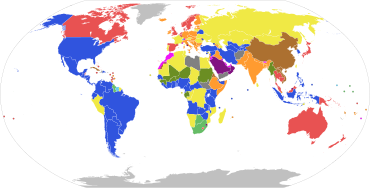
Back نظام برلماني Arabic نظام برلمانى ARZ Parllamentarismu AST Parlamentar rejim Azerbaijani Sistemang parlamentaryo BCL संसदीय ब्यवस्था Bihari সংসদীয় ব্যবস্থা Bengali/Bangla Parlamentarni sistem BS Democràcia parlamentària Catalan سیستمی پەرلەمانی CKB

Parliamentary systems: Head of government is elected or nominated by and accountable to the legislature
Presidential system: Head of government (president) is popularly elected and independent of the legislature
Hybrid systems:
Note: this chart represents de jure systems of government, not the de facto degree of democracy.
| Part of the Politics series |
| Politics |
|---|
|
|
A parliamentary democracy is a form of government where the head of government (chief executive) derives their democratic legitimacy from their ability to command the support ("confidence") of a majority of the legislature, to which they are held accountable. This head of government is usually, but not always, distinct from a ceremonial head of state. This is in contrast to a presidential system, which features a president who is not fully accountable to the legislature, and cannot be replaced by a simple majority vote.
Countries with parliamentary systems may be constitutional monarchies, where a monarch is the head of state while the head of government is almost always a member of parliament, or parliamentary republics, where a mostly ceremonial president is the head of state while the head of government is from the legislature. In a few countries, the head of government is also head of state but is elected by the legislature. In bicameral parliaments, the head of government is generally, though not always, a member of the lower house.
Parliamentary democracy is the dominant form of government in the European Union, Oceania, and throughout the former British Empire, with other users scattered throughout Africa and Asia. A similar system, called a council–manager government, is used by many local governments in the United States.